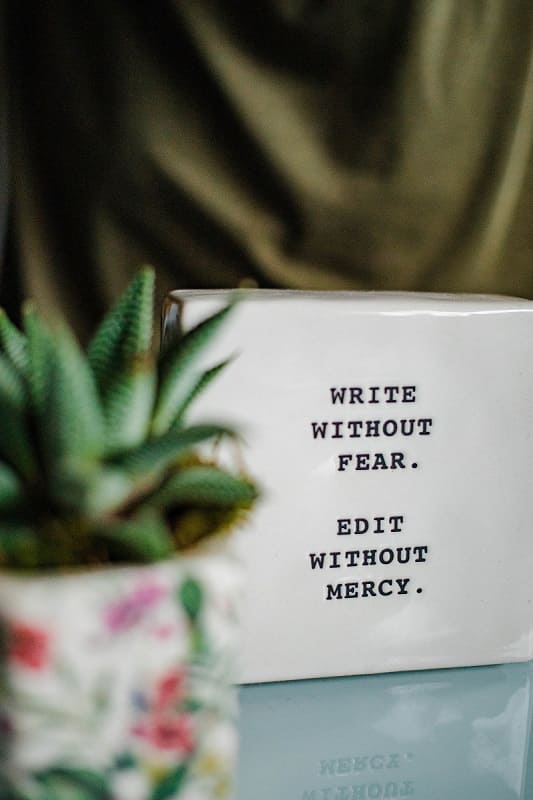You’ve just written the last few words of the last sentence of your manuscript, sealing all your hard work with the ultimate period. You feel invincible.
And why shouldn’t you?
You’ve just achieved the monumental task of finishing your book. Something that likely took more than just your time and creativity!
So, what’s next?
Obviously, it’s off to publishing, so you can start profiting off your amazing feat. Right?
Not quite so.
This is where we’re going to have to stop you. By all means, continue celebrating the end of writing—you’ve earned it.
But there are still a few things you need to do before you can put your book up for sale, especially if you’re aiming for the coveted bestsellers list.
In this blog, we will:
- Explain why self-editing isn’t the best option
- Describe the different types of editing and which one you need
- Explain beta-reading vs. editorial assessment
- Tell you how to find the best editor for your project
Can I Self-Edit My Book?
Although many first-time authors don’t know this, editors have much more than simply the ability to spot typos and grammatical faults.
As the book’s author, you are too close to the story—you’re right there with the characters, immersed in the narrative. And while you’re aware of every detail and nuance of what you’re attempting to say, sometimes, it’s hard to step away from your work and assess it objectively.
Contrary to this, a professional editor lends you a fresh pair of eyes and views your manuscript from a perspective you can’t. In order to produce the finest book possible, an editor is a critical voice who can point out what you’re missing, how to connect everything together, what should be removed, and what should be rewritten.
They aid in bringing out the greatest qualities in you and your story.
Understanding the Types of Book Editing
1. Developmental Editing:
A developmental edit will be a thorough macro evaluation of your draft’s overall structure and plot. This will concentrate on the storyline, pacing, depth, genre, topic, point of view, and how the characters integrate into the overall tale—especially for fiction novels.
The editor will transform your copy from an uneven and unfinished article into a whole and engaging book during such an edit. A developmental editor may be compared to a type of counselor who gives your work the most in-depth analysis according to the highest standards that will help you succeed.
Developmental editors may even recommend you delete certain chapters, add new ones, and offer solutions to important issues like “Who am I writing this book for?” and “Would it please my target market?”
You should expect long-term cooperation between you and the developmental editor because this is a thorough evaluation of your manuscript. Expect it to take some time, as this modification will be highly detailed.
We recommend that self-publishing authors have their book undergo a developmental edit before publishing or printing.
2. Copy Editing:
Simply put: copy editing helps enhance a draft’s readability. It is crucial to make sure everything is both factually and grammatically correct. Choosing the right words and consistently employing them to reach the right conclusions is a crucial aspect of copy editing.
A copy editor could even undertake line editing on your text. As the name suggests, they will review and revise the language structure line by line. This may appear crucial since, despite the abundance of factual information, readers might not always draw the same conclusions that the author hopes they will.
It is not advised to skip copy editing because grammatical errors can make or break your book!
Imagine yourself in a situation where you’re reading a book, and you keep coming across poor grammar and/or punctuation. How off-putting would that be?
You could, arguably, go for editing after publishing if your book receives unfavorable reviews—say you published your manuscript because this isn’t your first rodeo, and you’re very confident in your work. However, the cost of unpublishing—or pulling your book out of print—and having it edited will be way pricier than doing it from the get-go.
Remember: you may be confident that you’ve done your best but spending a few hundred bucks to acquire quality copy-edited work is worthwhile for authors.
3. Book Proofreading:
Proofreading is typically left until the end of the editing process to provide a comfortable and seamless reading experience. Proofreaders give the book one more polish before you submit it for publication, but they don’t offer input on the book’s substance, narrative, story, or grammar.
Correction of any typographical, punctuational, spelling, and grammatical problems is known as proofreading. This stage also entails formatting checks to ensure that your book doesn’t have any lingering or dangling text or extra spaces that might affect appearance or layout before it is printed.
Other types of editing also exist, such as technical editing, sensitive editing, and manuscript critique, all of which address certain editing requirements. However, the best editing flow for both self-publishing and traditional publication follows the order of the three types mentioned above.
The Difference between Beta-Reading and Editorial Assessment
Today’s market is filled with items evaluated by “beta testers” before being made available to the general public. A beta reader applies the same idea.
People who volunteer to read and review your work before it is published are known as beta readers. They will let you know which portions of your book succeeded and which didn’t after reading it, and they may even provide recommendations for improvement.
A beta reader offers a report on their beta reading, either verbally or in writing, based on their knowledge and the kinds of books they have read. Because various beta readers have varying levels of knowledge and experiences, their opinions are likely to differ.
However, having a beta reader read your work is a terrific method to receive fundamental input on what works and doesn’t.
In opposed to this, an editorial assessment, also known as a manuscript review, is a service that is provided by editors or other service providers in the publishing industry. It is also referred to as a “professional beta read” because it performs many of the same functions.
You are paying for a professional opinion on the development of the content of your book.
A skilled editor provides a manuscript assessment report. It is a complete and extensive examination of all elements of the manuscript. This report is a professional evaluation of the manuscript that should include useful information about what works and what doesn’t and ideas on how to make it work (in terms of style, point of view, character development, plot, etc.).
The editor who does the manuscript evaluation will be able to describe all of the major concerns that must be addressed.
What Kind of Book Editing Do I Need?
An editor may request to read your manuscript when you get in touch with them before agreeing to work with you. They are not attempting to steal your concept from you or evaluate your writing abilities.
To truly assess where your book falls on the editing continuum and whether it corresponds with where they fall, they just need to see what they’re working with. Perhaps surprisingly, you truly have no control over the type of editing you require. Here is a list of criteria you can use to assess where you stand:
- You need a developmental editor if you don’t know what to do with a half-formed idea or unfinished work.
- You need a substantial editor even if you’ve finished the book and believe it’s very decent.
- You need a copy editor if your work has undergone significant editing.
- You require a proofreader if your book has already gone through the previous stages.
What Can an Editor do for My Book?
If you’re still not clear on what an editor can do for you and why you need one, then we’re here to make it as simple as we can:
Whether your work is nonfiction, fiction, a children’s book, or another genre, an editor is a priceless asset. They will offer suggestions for revisions and criticism to help you make your book the best it can be!
Because every book editor is unique and has a distinct amount of experience and expertise, they will approach editing in various ways. In general, editors will adopt a “recommendation only” approach, but certain editors may be more aggressive and demand that you make changes to your manuscript.
Additionally, editors can assist authors in clearly defining their book’s objectives.
They can aid in capturing the reader’s interest. A book editor may enable you to improve your work—and are especially recommended if you’re a self-publishing author.
Where to Find a Book Editor for Hire?
When thinking about how to hire a book editor, examine the genre of your work and seek an editor that specializes in that area.
Consider how much editing your manuscript requires as well. Do you require someone to proofread each sentence? Or are you still seeking someone to assist you in developing the concepts and topics in your book? Determine which of the three editor types you require. Then use the following methods to find the right fit for your manuscript.
Ask For Recommendations
One of the greatest methods to locate an excellent book editor is through recommendations.
Ask any trustworthy writers you know if they are aware of any good book editors. They may also be able to recommend additional skilled editors who specialize in the type of editing you want.
Try to locate an editor who has worked on self-published self-help works that have been successful, for instance, if you are self-publishing a self-help book.
Search the Web
Start by searching for “book editing services” on Google. After that, focus your search on finding an editor who has worked on books similar to yours and has a strong portfolio.
Many publishing companies have come onto the scene and now offer bundle editing services that can include multiple types of editing to improve your work—TGS is one of them. Going for a service like this can help you save a considerable amount of time and money because you won’t have to find different types of editors again and again!
Questions to Consider Before Hiring a Book Editor
How Much Does Book Editing Cost?
Since prices vary greatly, We can offer some general direction on how an editor can bill you. It’s critical to remember that different editors bill differently: some charge a flat fee for the whole project, some bill hourly, some charge by page count, and others charge by word count. When selecting a book editor, it’s important to be extremely clear about cost and to obtain a written estimate.
Are There Any Questions I Should Ask An Book Editor Before Hiring Them?
Of course! Here is a list of questions we recommend you ask your editor(s) before taking them on board.
- Do you have a website where I can learn more about you and your editing experience?
- Can you edit a few pages for me so I can see an example of your work?
- What kind of editing do you provide, and how much do they cost?
- How long will it take from the beginning to the end of the entire process?
- How many revisions will I receive as part of this service?
- Do you provide any more services, such as creating Amazon book descriptions or book cover copies?
What’s The Availability of the Editor, And What Is Their Usual Turnaround Time?
Some writers have horror stories about hiring a book editor without having a clear timeline in place and having to wait months beyond the editor’s start date for the finished edit pass. Make sure any prospective editor specifies when you will submit your book to them and when you may anticipate receiving the corrected document back.
Parting Words
The cost of hiring a professional editor for your book is significant. Your greatest work will be held high as you cross the finish line with the support of a competent editor, who is like a coach cheering you on the entire way.





